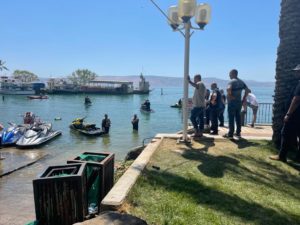On July 30, Israeli navy units pulled out the body of Palestinian citizen Raed Mahamid from the bottom of Lake Tiberias (Sea of Galilee) at a depth of 32 meters. Mahamid, a lawyer from the city of Umm al-Fahem, had gone missing during a cruise with friends on the lake, instigating a search effort by residents and authorities that lasted nine days before they finally found him.
As expected, the Israeli police and the army declared that they were proud to do their duty toward an Arab citizen, with the Israeli media echoing praise of the state’s ethical response. One could imagine seeing Prime Minister Yair Lapid bragging to the world about how this incident demonstrates the country’s humanity toward its non-Jewish inhabitants, with other government officials even inviting Palestinian youth to volunteer for the police and the army that found Mahamid.
This farcical portrayal of Israeli morality, however, does not reflect what actually happened at the lake. Rather, the recovery of Mahamid’s body is a story of the power of Palestinian popular action amidst a reality of exclusion that dominates all Israeli agencies.
I was among hundreds of Palestinians on the shore of the lake over the course of those nine days to support the Mahamid family. Since the early hours of the lawyer’s drowning, experienced sailors, swimmers, and the other men and women volunteers flocked to Tiberias to help search for his body. They came from all corners of the Palestinian homeland that are able to travel inside the “Green Line” — from the Naqab in the south, from East Jerusalem, from coastal cities, from the Triangle in the center, and from the Galilee in the north. People there spoke of how they wished that the besieged Palestinians of Gaza, renowned for their skills at sea, could be able to come to Tiberias; the coast is not complete without them.
Many of the volunteers at the lake did not return to their homes for days, searching from the morning and through the night while sleeping outside ready for any emergency. The numbers grew with each passing day, bringing more equipment, diving suits, rowing boats, and more. Many Palestinian families, shops, and bakeries donated food supplies, drinking water, and tents and accommodation supplies to help us stay on the shore. Arab lawyers also worked to push the Bar Association to pressure the Israeli government to use all its resources to rescue their fellow lawyer Raed.
The Mahamid family themselves were at the forefront of this rescue effort. The main supervisor of the search was Nael Mahamid, a lawyer and brother of the drowned soul, who was in constant contact with Arab journalists, Arab Knesset members, the Prime Minister’s Office, and the Director General of the Public Security Ministry, urging them to activate the state’s official rescue teams.
Raed’s wife, Halima, appeared on several media outlets and organized a protest on the main road of their hometown Umm al-Fahem to urge the state to greenlight the use of a special sonar device to find her husband. Had the authorities used the device earlier, Halima said, they could have found her husband much faster. As Raed’s mother shouted on the beach: “I want my son, I want to bury him, not to let him be eaten by fish.”
The Israeli police and army, as well as the emergency services, only came at a later stage — and even then they were initially of little help. The police officers at the scene prevented the Palestinian volunteer teams from using drones equipped with cameras, claiming it was for “security” reasons. This is the same police that has used such technologies to suppress and spy on Palestinian citizens for their political activism for years, including in Mahamid’s hometown of Umm al-Fahem, yet were now pretending that it is their duty alone to save the drowned.
Infuriated by the authorities hindering their search, Palestinian citizens escalated their protests against the state’s negligence; at the women’s demonstration in Umm al-Fahem, the crowd chanted: “Raed is drowned in the sea and the police are not helping.” The atmosphere felt ripe for the spread of more demonstrations in Arab towns calling on the state to harness its resources to find Mahamid, in the same way it would for any missing Israeli Jew around the world, whether it was on Mt. Everest to the peaks of Peru.
As a result of the increasing popular pressure and accompanying anger, a government official promised to use highly-sensitive military technologies, including the sonar device that detects objects at the bottom of seas and is used exclusively by marine commandos, on the condition that no civilians be present in the area. It was then that the Police Commander-in-Chief suddenly declared to the media that “the state spares no effort and the police and army are using the latest technologies available in the navy and air force.”

